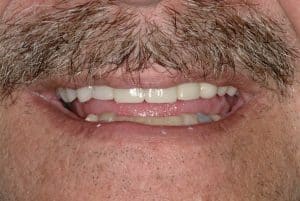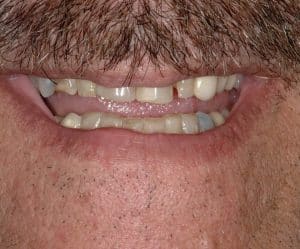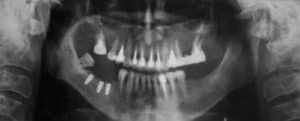Tooth Wear Treatment
The next time you visit your dentist, you might want to ask about tooth wear, if your dental professional doesn’t bring the subject up first.
Tooth wear leading to an uneven, aged smile
Smile after treatment
Tooth wear is defined as damage to the tooth’s structure that isn’t caused by accident or injury.
As it turns out, dentists are seeing more patients with tooth wear than ever before.
And the causes of that wear can have big impacts on your treatment options.
Here are the facts about tooth wear that might have you schedule an appointment with your dentist in the very near future.
Causes of Tooth Wear
“There are three primary causes of tooth wear: Attrition, Abrasion, and Erosion,” explains Dr. Brusky.
He adds that all three can contribute to severe tooth wear.
Attrition
“Tooth wear by attrition is caused by the constant clenching or teeth grinding,” says Dr. Brusky.
The Dentist further explains that many patients with the attrition type of tooth wear are sufferers of Bruxism, which is the inadvertent grinding and clenching of the teeth.
While the causes of Bruxism haven’t been proven, experts believe the disorder is caused by stress, anxiety and other psychological components.
According to Dr. Brusky, attrition tooth wear typically occurs on the anterior or front teeth first.
Abrasion
“Friction is the typical cause of abrasive tooth wear,” explains Dr. Brusky.
The Dentist says that you can experience this type of wear by brushing your teeth too vigorously, particularly if you use a hard bristle toothbrush or toothpastes containing more abrasive particles.
Dr. Brusky says that wear caused by abrasion typically happens on the posterior or back teeth first.
He has a handy test to determine if you suffer from the abrasive type of tooth wear.
He says, “You can usually tell if you have abrasive wear by looking for a wedge or V-shaped indentation near the gum line of your back teeth.”
Erosion
Dr. Brusky explains that this type of tooth wear is caused by acid. There are two kinds of acid that affect the teeth – dietary and gastric.
“Dietary acid is contained in all soft drinks, some foods and even in sparkling mineral water,” he says.
He further adds that gastric acid can affect the teeth if you experience GERD or if you voluntarily and regularly vomit, such is the case with disorders like bulimia.
“The acid from your stomach is designed to dissolve food, but can also eat through bone and teeth,” he says.
Dr. Brusky asserts that acid will attack the enamel of the tooth first. Enamel is the hardest substance in the human body, but it can be worn away completely.
When your enamel is gone, the acid will then begin attacking the dentin or the meat of the tooth.
“Dentin wears away at a rate of 7 to 9 times faster than enamel. Without enamel, the tooth wear gets worse and more teeth to get involved,” says Dr. Brusky.
Severe Tooth Wear
Dr. Brusky says that a person’s bite will always compensate for wear in a variety of ways.
He explains that with attrition, the patient’s front teeth will get continually smaller. As they do, the teeth will then erupt to compensate and to retain the same bite structure.
With erosion, the teeth wear away to the point where both enamel and dentin is gone. The longer the wear is left to worsen, the more teeth will get involved.
That is when nerve involvement is imminent. If the wear extends too close to the nerves, it will become very sensitive and could eventually die. Endodontics (root canals) may be necessary to save the affected teeth.
The oral function can also be drastically affected, says Dr. Brusky.
The Dentist describes how chewing food can become more difficult, and the patient my experience severe sensitivity to sweet, hot and cold foods and drinks, and pain may even result.
When the teeth compensate and move to meet the same bite structure, facial aesthetics can also become affected, Dr. Brusky says.
He adds, “The cheeks can sag, and the lips can become creased, leading to the person looking much older than their chronological years.”
The Source
The dentist’s first course of action is to discover why you are experiencing tooth wear in the first place.
If tooth wear is caused by attrition, for example, excessive grinding or pressure can fracture or break future restorations.
You may have to be fitted with an appliance you’ll wear while you’re sleeping to alleviate the wear and to prevent future damage from being done.
You may have to learn to brush your teeth with less pressure or change your diet so that you’re consuming less acidic foods.
Or you may have to be treated for gastric reflux if stomach acid is the culprit.
Treatment Options
To repair the damage done by tooth wear, Dr. Brusky advises early treatment to mitigate damage and costs.
“So that tooth wear doesn’t affect the size of your teeth, the quality of oral function, or the appearance of your face if left to worsen, treatment is advised as soon as the wear is detected,” he says.
For wear on the anterior and posterior teeth, Dr. Brusky says that he would typically use a tooth-colored composite that can be used to restore the teeth to their proper size and shape.
Dr. Brusky says that composite materials can also allow for treatment to be done in phases. The composites last for months and in some cases years and enable you to test drive the new look and feel of your teeth before more restorations are used like porcelain crowns.
In some cases, the Dentist will use a procedure called crown lengthening if the teeth have become so short that restoring the teeth becomes a challenge.
Dr. Brusky says that orthodontic work can also be used to reposition (intrude) the teeth after they have overerupted in response to the wear.
The good news is that, according to Dr. Brusky, once the teeth are restored, tooth wear will stop completely.
He says, “With proper treatment, even if you grind your teeth, brush too hard or eat acidic foods; the teeth will be protected, and you can enjoy a healthier smile, better aesthetics, and improved oral function for years to come.”
If you suspect that you are suffering from tooth wear and wish to know more about the causes and the various treatments available to you, schedule an appointment with Dr. Brusky today in Green Bay, WI to discuss your options.








Great article — it offers a clear explanation of the different types and causes of tooth wear (attrition, abrasion, erosion) and why we should take it seriously. I’d just like to add that early intervention is key: once enamel is lost and dentin gets exposed, wear accelerates and the risk of sensitivity, crown loss, or bite collapse increases. Regular bite analysis, mouth-guard therapy for grinding, and reducing acidic exposure are practical ways to slow the process. Thanks for raising awareness—awareness + prevention can genuinely protect smiles in the long term!